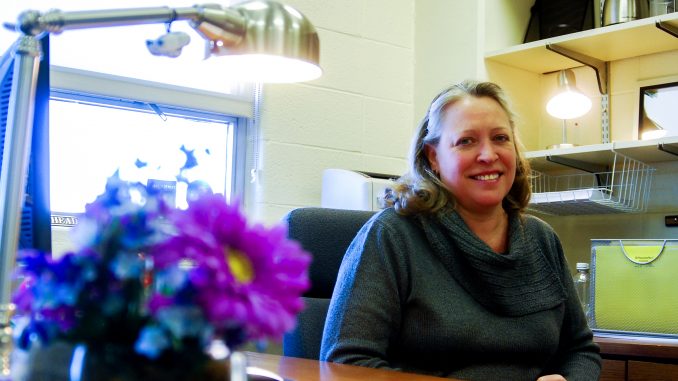
Newly appointed Journalism Department Chair Carolyn Kitch emphasizes that in order to respond to ideas that the future of journalism is murky, students have to consider the past.
“I feel positively about the future of journalism because I have the perspective of history,” Kitch said. “I understand that right now is a moment in history.”
Kitch stepped up to head the department early this month after 16 years in the School of Media and Communication, teaching for many departments and graduate programs while producing research on the history of media.
“She is one of our school’s most stellar scholars,” School of Media and Communication Dean David Boardman said. He added that he is thrilled for Kitch to take over the department.
The previous chair of eight years, Andrew Mendelson, left the department in December to serve as associate dean at the City University of New York’s Graduate School of Journalism.
“I’ve known her for 20 years,” Mendelson said. “I know the program is going to keep drawing people in – she’s an inspiring person to be in this position.”
During his time as chair, Mendelson introduced Philadelphia Neighborhoods as the capstone course for the department as a way to bring together different skills and multimedia to the curriculum.
“Many students go into the class with an understanding of the medium they want to be in,” Kitch said of the course. “But this project makes it clear. Students come out of it saying, ‘I’m a photographer’ or ‘I want to work in broadcast.’”
The central Pennsylvania native traveled to Boston University in pursuit of a career that incorporated her love of literature, history and theater in terms of how they engage communities.
While studying in Boston, Kitch said she realized problems that occur in every city, especially in Philadelphia, where she now lives and works. She said the two cities are known for their neighborhoods and issues that grow in those neighborhoods.
Kitch said that essentially journalism does two things: the practice provides information and opens dialogue. She stressed that journalists hold powerful positions in terms of deciding what is important, how issues are covered and how to deal with issues of civility and difference.
During her time at Temple, Kitch said she has watched mediums adapt in the face of doubt.
“We have all of this evidence from the past that journalism survives,” she said, “that people still need journalism, that young people will want to do it and that the form of it will change in ways that are unrecognizable right now.”
This evidence, she said, spurs the thinking for new mediums.
Kitch said she believes people are scared to think about where the industry is going when they think about mediums that have taken over or changed other outlets, but emphasized that people will always need information.
“You’re in a position where these industries are unfolding in front of you,” Kitch said. “You get a hand in inventing what they will become.”
Kitch said that one of the most memorable stories she worked on was one that she didn’t author, but edited. During her time at Good Housekeeping magazine, she helped get an essay in print that dealt with death. She said having a hand in producing stories that people were able to connect to and begin a dialogue is a standout moment in her career.
Kitch said the program she now heads is beneficial even if students don’t pursue journalism as a career path.
Kitch also said the curriculum is allowing students and faculty to discover new economic models for new outlets, like National Public Radio, which is both privately and publically funded, and which Kitch considers to be a successful medium.
Kitch, who has served as the faculty director of the SMC Study Away programs in London and Dublin, also stressed the experience and importance of the learned diversity that comes within mediums in different cultures.
While society may change how and where they get their news, Kitch is confident that we will always need successful, innovative journalists to inform the public.
“What you’re doing right now is what people did 30 years ago, 100 years ago – which is talk to a human being and write,” she said.
Paige Gross can be reached at paige.gross1@temple.edu or on Twitter @By_paigegross.


Be the first to comment